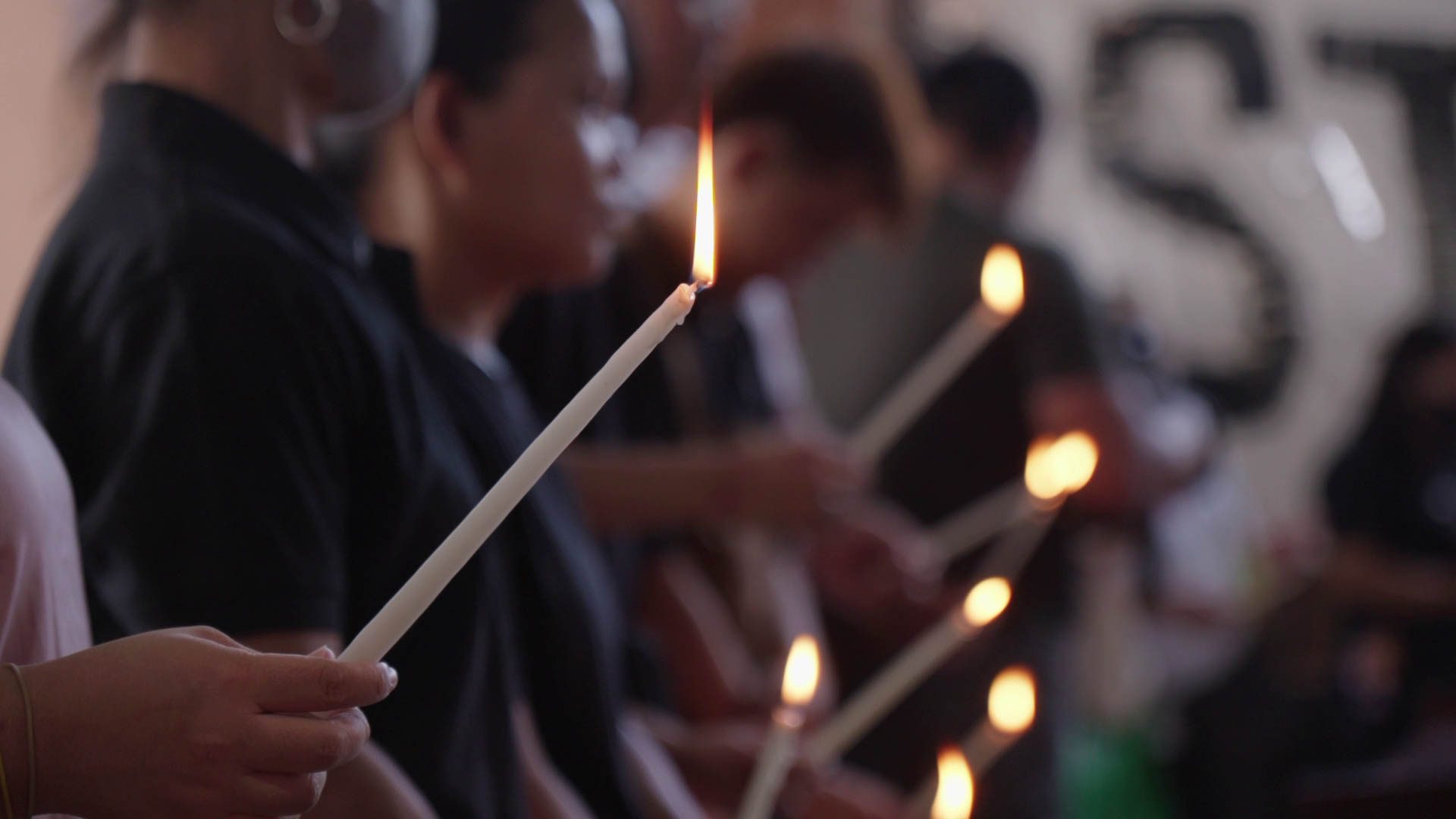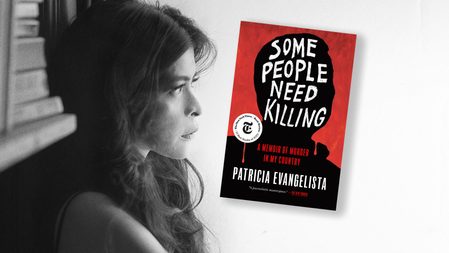SUMMARY
This is AI generated summarization, which may have errors. For context, always refer to the full article.

MANILA, Philippines – Memory is often fickle and complicated, but not for families who continue to hold on to the words of their loved ones killed in Rodrigo Duterte’s violent war on drugs.
The bravery of those left behind to tell their stories is one of the main foundations – if not the main one – of journalist Patricia Evangelista’s critically acclaimed book Some People Need Killing: A Memoir of Murder in My Country.

Inside a church full of drug war victims’ families in Payatas, Quezon City – one of the first events of her Philippine tour – the former Rappler investigative reporter emphasized the important part they played in allowing her to tell their stories.
“Walang libro, walang kuwento, walang istorya, kung iyong mga taong nakakita, ang mga taong nakaramdam, sinabi nilang ‘ayoko magkuwento dahil takot ako’,” Evangelista said on Monday, April 8, emphasizing the climate of fear that continues to exist.
“Pero kasi nagkuwento kayo, wala akong karapatang hindi magkuwento,” she added.
(There would have been no book, no stories, if the people who witnessed and experienced the horrors said that they were too afraid to tell their stories. But since they trusted me with their stories, I have no right not to tell their stories.)
One of those who trusted Evangelista is Jane Lee, whose husband Michael was gunned down by unidentified men in May 2017, leaving her to care for their three children. Since then, Jane has volunteered for Rise Up for Life and for Rights, a group composed mostly of widows and mothers steadfast in calling for justice for drug war victims.
Jane admitted that constantly speaking about her experience can be hard, but she has accepted that it is something she has to do.
“Nais kong samantalahin ang pagkakataon para sabihin na nagsasalita kami dahil gusto naming patunayan na kami ang patotoong buhay na meron talagang malawakang patayan,” she said during a sharing session on Monday organized by artists’ group Respond and Break the Silence Against the Killings (RESBAK).

“Kung ito ang tangi naming magagawa, iyong magsalita para sa mga mahal namin sa buhay at sa iba pang mga biktima, bakit hindi natin araw-arawin kung iyon ang bahagi namin para sa hustisyang nais naming makamit?”Jane added.
(I want to take every opportunity to speak up because we want to show that we’re living proof that there were widespread killings. If this is what we must do, to continue talking about our loved ones and other victims, we will do it every day if it means getting justice.)

Telling their stories
It has been almost eight years since Duterte, from the presidential pulpit, ordered his men to kill suspected drug personalities. The night after his inauguration, in front of a poor community in Tondo, he urged parents to themselves kill their children, warning that death will catch up with anyone who dares to get involved in illegal drugs.
The former Davao City mayor fulfilled this warning. He left Malacañang in June 2022 with a trail of blood and violence, with at least 6,252 individuals killed in police anti-illegal drug operations alone. Including those killed vigilante-style would raise the number to almost 30,000 killed, according to estimates of human rights groups.
The death toll between 2016 and 2022 is staggering to say the least, with many of these victims gunned down in front of their families inside their own homes, or whose bodies were dumped on sidewalks or creeks. Each night, families would recall to a steady stream of media the last moments of their loved ones – the begging they heard, or the last words they said before they disappeared only to turn up lifeless hours after.
In her reporting and eventual book, Evangelista always sought to put a human face to the numbers, to go beyond details of incidents and try to translate into pages the life the victims led.
Rodalyn Adan’s husband Crisanto Abliter – whom she called “mahal” (love) – was one of the people rounded up by authorities during a big time operation in 2016. She would later receive a call from a relative, asking what funeral parlor they would use for Crisanto, who died from gunshot wounds.

It’s been almost eight years since that fateful day, but the pain remains fresh. When things get rough, Rodalyn tries to remember how caring and loving her husband Crisanto was to their seven children, including a then-one-month-old infant.
“Si Crisanto, kapag dumarating siya sa bahay, sasalubong ang mga bata, yayakapin siya at may mga pasalubong po siya,” she recalled. “Para sa akin, sobrang mapagmahal po niya na kahit po nag-away kami, gusto niya ilang minuto lang bati na kami.”
(Whenever Crisanto goes home, bringing with him goodies, our children would rush to meet him at the door and hug him. He was also a really loving husband. Our fights never lasted that long.)

Marilyn Malimban, whose partner Jessie Cule was killed by police in August 2016, encouraged other widows and mothers not to lose hope, and to continue speaking out for justice.
“Huwag tayo matakot, tayo po ang pinatayan, hindi tayo ang pumatay,” she said. “Magkuwento tayo nang magkuwento kahit hindi tayo makakuha ng hustisya… makakamtan natin iyong, kung hindi man dito, meron sa taas na magbibigay ng hustisya para sa mga mahal natin na pinatay ng mga pulis.”
(Let us not be scared. We are the ones who lost loved ones who were killed. We were not the ones who killed. Let’s continue telling our stories even if we don’t obtain justice. We will get it there, maybe not here on earth, but there’s someone above who can give justice for our loved ones killed by police.)
Aid for justice
Thousands were killed and yet justice remains elusive for the victims and their families. Only a few have been convicted in drug war-related killings, including the policemen involved in the deaths of 17-year-old Kian delos Santos, Carl Angelo Arnaiz, and Reynaldo “Kulot” de Guzman.
The International Criminal Court (ICC) is investigating killings committed under Duterte’s drug war. The court’s appeals chamber in June 2023 rejected the Philippine government’s appeal, meaning ICC Prosecutor Karim Khan’s probe can continue. There is no set timeline as to when new developments – including a possible arrest warrant – will happen.
Kristina Conti, secretary general of the National Union of Peoples’ Lawyers-National Capital Region (NUPL-NCR), said that continually telling and documenting stories of drug war victims is important even if the legal route might be long and uncertain.

From the legal perspective, she said these could count as “perpetuation of testimony” which could make the stories public and could help gain traction in international bodies, such as the ICC and even the United Nations.
“[In crimes against humanity], the discussion is about patterns, what happened – that’s why the fact of the killings has already been established. What we need to know and what we need to establish is if all these killings are related,” Conti, ICC-accredited assistant to counsel, explained to Rappler in a mix of English and Filipino.
“And if these stories are all out there, and they mirror one particular narrative, that it was Duterte who ordered these killings in 2016, definitely these could become part of the overall context of the case,” Conti added.

Father Danny Pilario, one of the most outspoken Catholic priests against extrajudicial killings under Duterte, praised families who remain resolute in calling for justice even in the face of harassment. Aside from being the president of Adamson University, he also organized Project Solidarity for Orphans and Widows of Payatas (Project SOW) that helps families find livelihood, among others.
“Nais kong pasalamatan ang mga nanay na tumayo sa kanilang sariling mga paa hanggang ngayon, kahit na hindi naniniwala ang mundo, kahit na hindi naniniwala ang mga politiko, kahit na ayaw pakinggan ang kanilang mga kuwento,” Pilario said.
“Narito sila ngayon, buhay at nakikitang nakikipaglaban para sa hustisya at kapayapaan,” he added.
(I want to thank the mothers who remain standing until now even if the world doesn’t believe, even if politicians don’t believe and won’t listen to their stories. They are here today, alive and fighting for justice and peace.) – Rappler.com
1 comment
How does this make you feel?




![[WATCH] Bamban POGO scandal: There’s a bigger fish than Alice Guo](https://www.rappler.com/tachyon/2024/07/inside-track-tcard-bamban-pogo.jpg?resize=257%2C257&crop=435px%2C0px%2C1080px%2C1080px)
![[Vantage Point] China’s silent invasion of the Philippines](https://www.rappler.com/tachyon/2024/07/TL-china-silent-invasion-july-16-2024.jpg?resize=257%2C257&crop=318px%2C0px%2C720px%2C720px)

![[The Slingshot] Lito Patay’s 4 hours and 38 minutes of infamy](https://www.rappler.com/tachyon/2024/07/Lito-Patay-4-hours-infamy-July-19-2024.jpg?resize=257%2C257&crop=233px%2C0px%2C720px%2C720px)

![[The Slingshot] A Duterte and Bato cop named Patay](https://www.rappler.com/tachyon/2024/06/tl-lito-patay.jpg?resize=257%2C257&crop=322px%2C0px%2C720px%2C720px)





I am inspired by the strength of these women who continue to tell their stories and to Pat Evangelista who gave them the platform to voice the narrative of loss and justice.